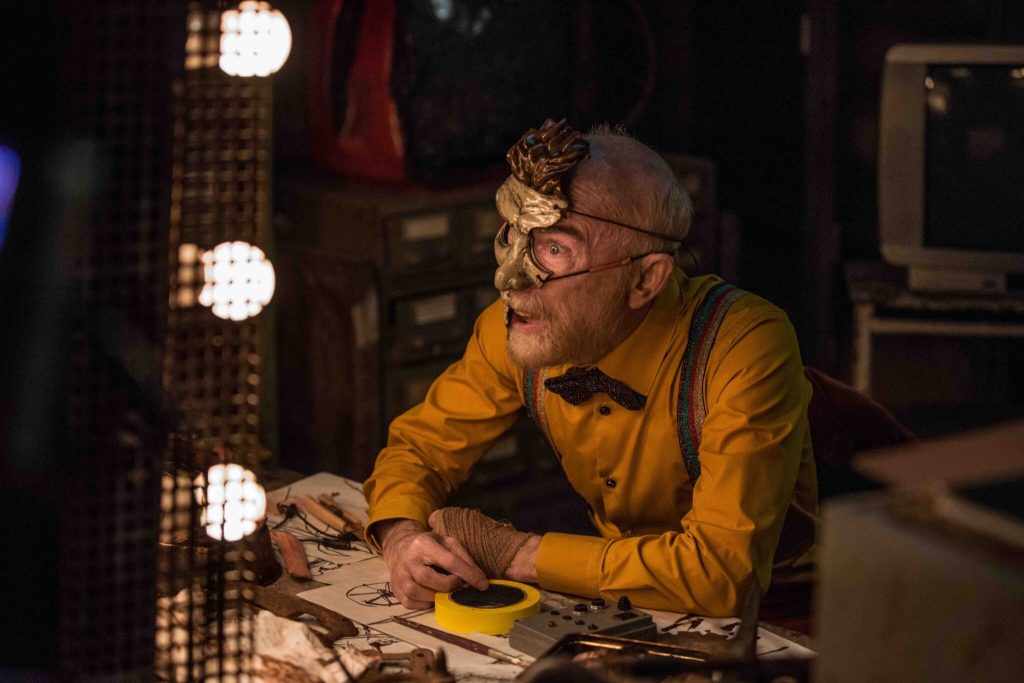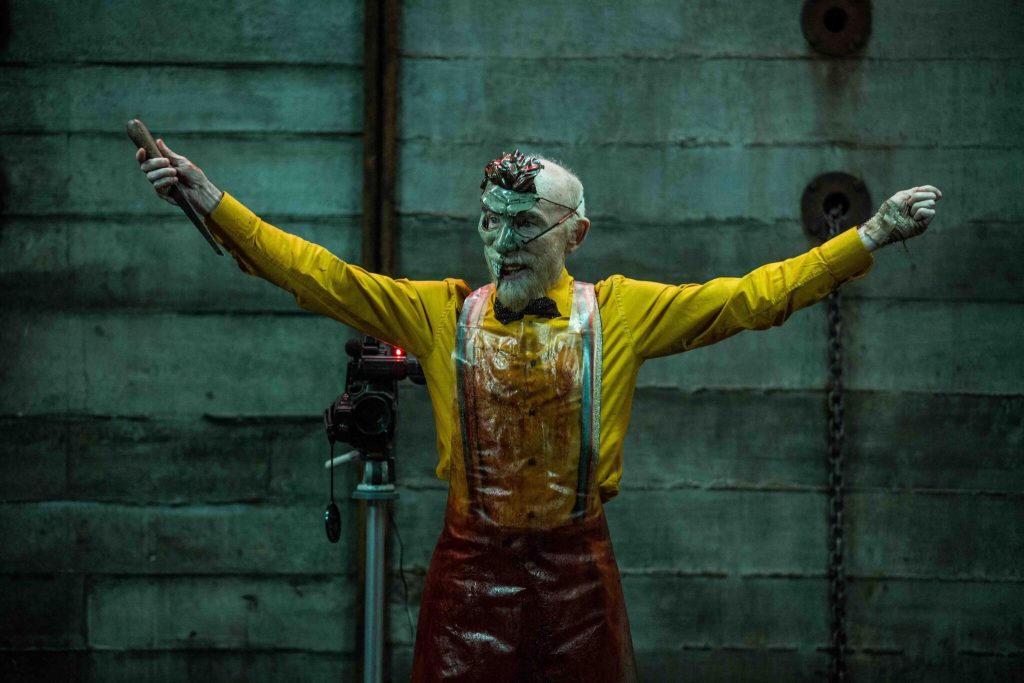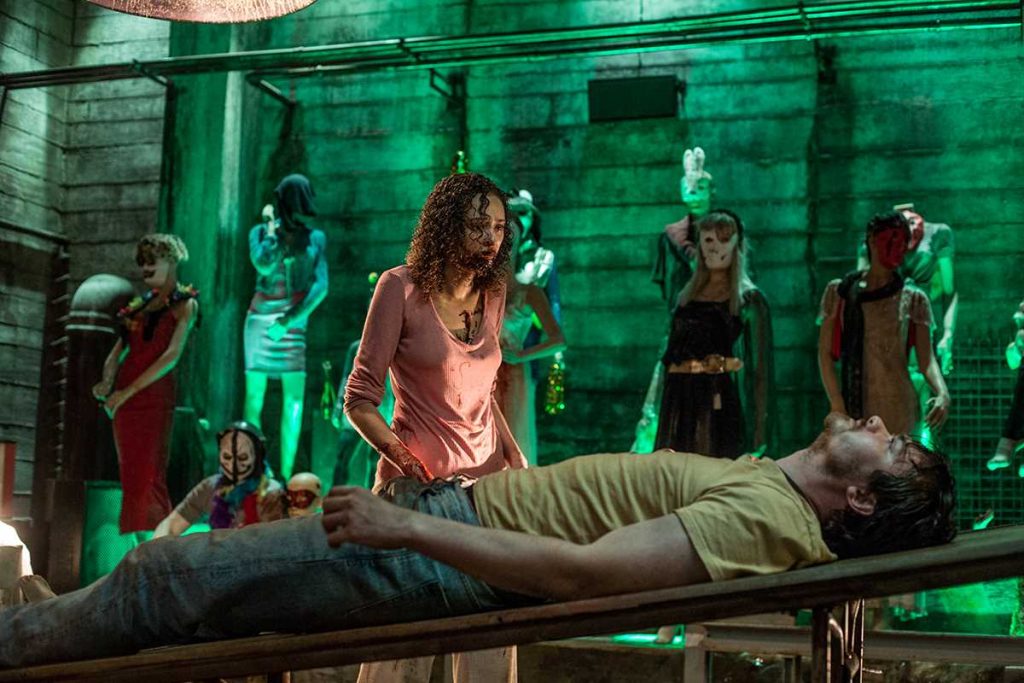
A single room, flickering lights, a broken camera feed and no escape. That’s the world you’re thrown into when you first step inside Your Host. From the opening shot you sense that nervous breathing, the smell of sterilised metal and the uneasy thrill of being both spectator and victim. Director D.W. Medoff presents a brutal little arena, a trap-filled playground where the host doesn’t merely observe the horror—he orchestrates it.
Four friends awake in an unfamiliar space, strapped to chairs, told they must play. The rules are cruel. Every game ends in blood. Every choice has consequences. The film wastes no time establishing stakes: you’re locked in, you’re scared, and you must survive. Writer Joey Miller leans hard into the “torture-game” aesthetic, familiar territory to fans of Saw, but Medoff and his team try to twist the expectation with a sadistic game-show framing, and the unpredictable figure of the Host (played with chilling control by Jackie Earle Haley).
If there is one thing the film gets uncannily right, it’s the casting of Jackie Earle Haley as the Host. In the role, he strips away sentimentality and builds a presence that dominates the frame. With a smile that never truly reaches his eyes, he becomes both referee and puppet-master, showman and executioner. It’s the kind of performance you never doubt for a second—unique, memorable, and unmistakably his.
Yet—and this is the paradox—the film around him doesn’t live up to the performance. The supporting cast fluctuate between overwrought theatrics and plain mediocrity, making every scene with Haley feel like he’s acting in a league of his own. In other words: the film benefits from him, but the film does not elevate him. He is too good for the material he’s been handed.

The four victims—friends on a getaway gone wrong—arrive with minimal back-story, which might have been a stylistic choice. But by the time their personal histories are revealed, the emotional bond has not been built. I found myself asking less “How will they escape?” and more “Why should I care?” A few lines about debt, betrayal, or failed relationships appear mid-film, but they feel like afterthoughts. A film of this kind only works if you’re rooting for someone—if you’re willing to feel their fear. Here, that investment is absent, and as the traps grow harsher, the suspense thins let alone their acting didn’t help to elevate the experience a bit, on contrary it harmed it.
But, we’ve been here before. The “torture game” sub-genre reached its high watermark years ago, and films like this now risk being echoes rather than innovations. Your Host doesn’t shy from that; it leans into spectacle because the emotional or thematic depth never arrives. And when the suspense matters less than the setup of the next trap, the horror side of horror falls away. For viewers seeking shocks and blood, this will satisfy. For those seeking dread, surprise, or character stakes—it won’t.
Despite the competence—and even the flair—the film never truly becomes frightening. Horror isn’t just about the blood; it’s about seeing a reflection of yourself, feeling dread for someone you care about, or discovering that the rules you thought you understood are wrong. Here the rules are clear, the victims are unknown to us, the Host is the only one we understand. That imbalance curtails the emotional impact. Even as the bodies drop and the screams rise, the film doesn’t pull you in—you remain safely on the other side of the glass.

There’s no escaping the comparison to Saw. The locked room, the moral tests, the trap-based theatrics—these are its DNA. By contrast, Your Host doesn’t offer fresh moral complexity or appealing protagonists; it trades in blood for interest, and mechanics for meaning. Recently the genre has seen audiences respond to films like Terrifier 3—rare examples that lean into gore with unapologetic personality. Your Host wants to be part of that resurgence, but it lacks the spark of identity. It’s competent, but not definitive.
Your Host is a film of missed opportunities—great talent stranded in familiar terrain, characters you don’t root for, acting that does not resonate, horror that never quite scratches beneath the surface.
Rating: ★★★★☆☆☆☆☆☆ (4/10)
